Arora receives Lambert Prize

Arora receives Lambert Prize
- May 30, 2024
- Honor recognizes the economics Ph.D. student for outstanding work addressing foundations of the formal, natural, or social sciences
Parush Arora, economics graduate student, is one of three recipients of this year’s Justine Lambert Prize. The honor recognizes students for outstanding work addressing foundations of the formal, natural, or social sciences. Below, he shares more about his award-winning work – “Combining Density Forecasts using Bayesian Opinion Pools” - and his future plans which include joining the Department of Economics at Ashoka University in Sonipat, India as an assistant professor in July, following receipt of his Ph.D. in June.
Q: Give us some background on your educational trajectory. What made you decide to pursue your current field of study, and specifically at UCI? What interests you most about your work?
A: I earned my bachelor’s in economics degree from Hansraj College, University of Delhi and master’s in economics degree from Madras School of Economics.
My decision at my bachelor’s level was based on the combination of the career prospect for economists and my lack of interest in other subjects. During my master’s, I was taught a course in advanced macroeconomics by Professor Naveen Srinivasan, whose method of teaching, command over the concepts and passion for the subject were intellectually stimulating. Every lecture was packed with interesting policy questions of the real world and the policy recommendations emanating from various schools of thought. He is the major reason why I was motivated to pursue my Ph.D. in economics with specialization in macroeconomics and thus, chose UCI since it has a strong macroeconomics department.
During my first year in UCI, I became interested in econometrics, especially in my third quarter where Prof. Ivan Jeliazkov taught us the subject from the Bayesian perspective. I decided to switch to econometrics as my primary field of research and there is no looking back from there. I enjoyed my time researching in the field and in hindsight, made the best possible decision but as economists say, who knows the counterfactual. Currently, I find investigating time series econometrics model from the Bayesian perspective very interesting. I like identifying the advantages of the new approach compared to the existing literature and plan to continue research on the same lines in the following few years. I enjoyed teaching graduate econometrics class as well.
Q: Tell us about your research. What problem will your findings help solve?
A: My research focuses on time series modeling and forecasting from a Bayesian perspective. The body of my work attempts to explore the time series econometrics techniques involving model averaging, non-parametric modelling, and models with dynamic factors. These models have wide applications in macroeconomics or any field with time series analysis. My work attempts to build upon these techniques so that they can uncover hidden relationships from the data and their use is expanded to broader applications.
Q: Tell us about your campus accomplishments and activities since your arrival at UCI.
Best Teaching Assistant Award (2021-2022) from Department of Economics
Best Econometric Paper Award (2022-2023) from Department of Economics
President (2021-2023), Cricket Club at UCI
Q: Who have been your faculty mentors while here, and what impact have they had on your graduate career?
A: Prof. Ivan Jeliazkov is my advisor. He guidance and feedback has played a significant role in how I currently perceive the process of research. He mentored me in developing essential skills for academic and professional success, such as writing, presentation, and critical thinking skills. I am very grateful to him for his time and effort throughout my Ph.D. journey.
Q: When do you plan to complete your Ph.D.? What are your plans thereafter? How has UCI prepared you well for this role?
A: I am completing my Ph.D. in June 2024. I will start as an assistant professor in the Department of Economics at Ashoka University in July 2024. The rigorous training I got in econometrics from UCI prepared me to engage in high quality teaching and research which is necessary for obtaining tenure at Ashoka.
Q: Any other tidbits you’d like to share?
A: I think, one of the most important aspects of my Ph.D. life, which is not generally emphasized a lot is to have a good social circle and friends around. The depression rates in Ph.D. are very high and I was lucky to be surrounded by like-minded people with whom I have made lifelong relations (hopefully) and they helped me stay sane throughout my journey.
-----
Would you like to get more involved with the social sciences? Email us at communications@socsci.uci.edu to connect.
Share on:


connect with us: